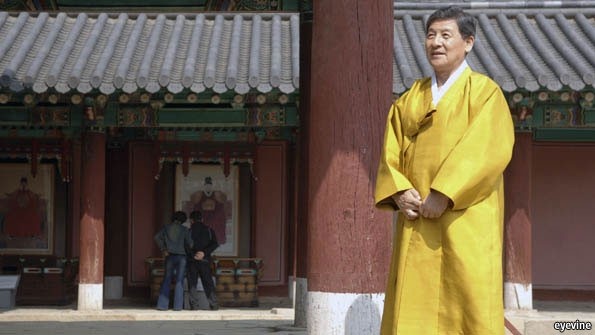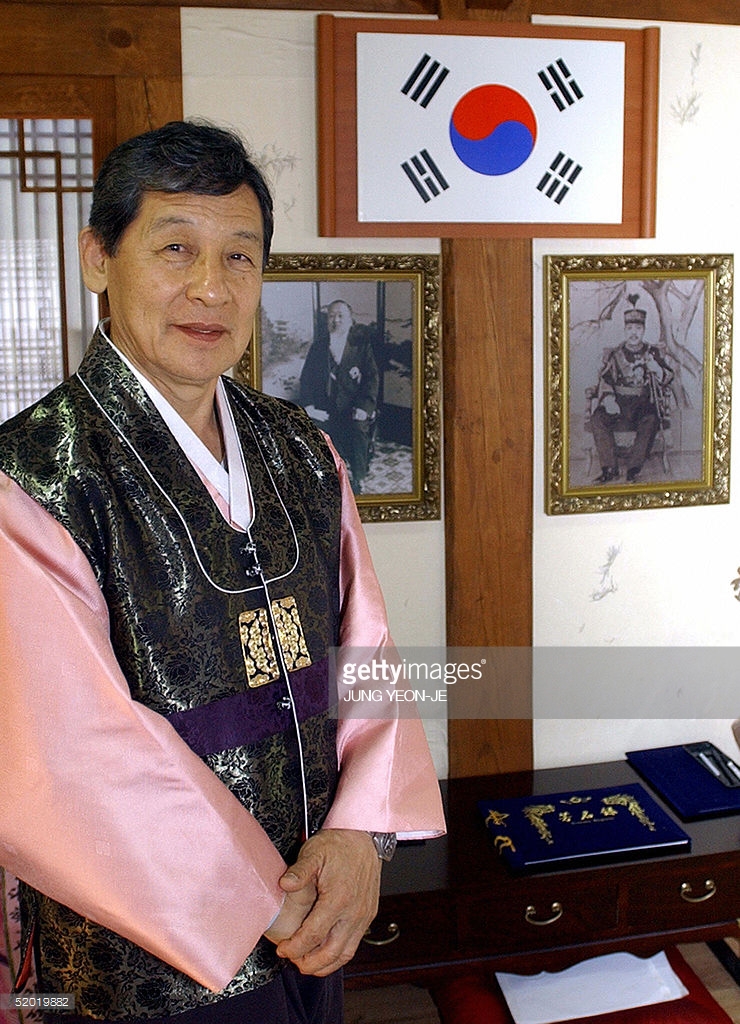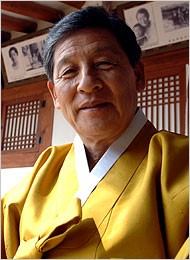

 字體:小 中 大
字體:小 中 大 |
|
|
|
| 2018/05/02 22:23:02瀏覽108|回應0|推薦0 | |
Yi Seok20th Century BoyMay 8th 2012, 12:58 by D.T. | SEOUL
IN SOUTH Korean politics the word "conservative" tends to denote those wishing to preserve the economic philosophy of the go-go 1970s and 80s. Small-"c" conservatism and a love of tradition do not usually feature: this is a country keen to escape a painful past. Pity then Yi Seok, a man who paid a higher price than many for modern South Korea. Mr Yi is a scion of the Jeonju Yi family, which ruled Korea from 1392-1910 (they were kept on as puppet quasi-royals by the invading Japanese after that). A palace-born grandson of Gojong, the countrys penultimalte monarch, he is considered the Yi household’s rightful successor by many. Had the 20th century, with its colonialism, war and division of Korea, not happened, Yi Seok may well have been King of Korea. Instead, Mr Yi and his family had to make a living. For his mother, Lady Yang, this meant selling noodles at the local market. For him, it meant singing to American officers at the swanky Walkerhill Hotel, where he performed alongside stars like Louis Armstrong (“I thought he was in his room practising, but when he came out he had powder on his hands,” he told The Economist) but earned a distinctly un-princely 8,000 won per month. He was later drafted into the Vietnam War. “History was gone. And in Vietnam there was no future, only the present. I just went there to die,” he says. A shoulder injury saw him invalided-out after a year and a half. He took up singing again, even having this modest hit. But the good times did not last. Having been allowed to live in one of the old imperial palaces throughout the 1970s, he and his four brothers were ordered out at gunpoint in December 1979 by troops loyal to General Chun Doo-hwan, who had just staged a coup. After emigrating to America—first as an illegal immigrant and later, through marriage, as a legal one—he took a number of odd jobs including house painting and pool cleaning. He later became the proud owner of a liquor store in Inglewood, California, which was held up by gunmen 13 times. Following another return to Korea in 1989 he suffered a car crash, emerging from a coma after 12 days. “I just laughed and laughed, because life was so empty. The doctor thought I was crazy.” Penniless and lost, Mr Yi spent much of the 1990s as a drifter, staying in monasteries. Buddhism, he says, helped him detach himself from his troubles. Finally the city of Jeonju, the historic hometown of the Yi clan, awarded him a house, where he lives to this day as a human tourist attraction. Lecturing on Korean history also keeps him busy. Mr Yi’s home is in the Hanok Village area of town. Though most Koreans live in apartments, Hanoks (traditional Korean houses) are currently the subject of renewed attention, alongside other aspects of ancient national culture. This history-averse country looks to be finally ready to take the occasional proud, nostalgic glance over its shoulder. A recent TV series, "The King: Two Hearts" imagines what modern Korea would be like if it had a monarchy. 72-year-old Yi Seok’s chances of becoming a symbolic, restored king of Korea seem small. But at least the ending of this turbulent, 20th-century life should be a happy one. « The politics of nuclear power in Japan: A sticky summer ahead Trade between India and Pakistan: New life on the border » · Recommended · 57 20th Century Boy May 15th 2012, 04:22
Every one loves to tell the unity memories of progressively glorious history, especially arduous aspects. So does South Korean, when it comes to Li’s Chosen (Yi’s Joseon dynasty). For more than a decade, South Korea has produced numerous drama of history - like the Economist’s talk of “The King: Two Hearts” - which excited the prosperity of Korean Cool with rapid economic growth.
I am one of the fishes who follow this trend until now. In 2001, KBS drama “The Last Empress” sentenced a miserable life - Myeongseong of Emperor Gojong’s wife. This drama, played by Lee Mi-yeon and Yun Dong-geun, aroused the awareness of Korean nationalism and encouraged the union of this nation of “hermit”. In commemoration of this well-known female ruler, many sayings around the past royal house began to be raised with mourning. The ever-prevailing song, “If I leave” with this drama, tried to show the optimism with eagerly escaping the shadow through the long-term sufferings from Japanese Ito Hirobumi’s invasion.
Five years later, MBC’s “Princess Hours” or “an imprudent princess of palace”, a breakthrough in full-range aspects of Korean drama, appealed to Korean as well as many people in Asia to satisfy their image of royal family in Seoul. Meanwhile, I always listened to this soundtrack, mainly attracted by “Perhaps Love” by Howl & J, for feeling the “sa-la-nei (in Korean)” (which means I love you) smile. Moreover, I chase after Korean Cool by purchasing the contemporary world’s fashion - LG Chocolate mobile phone from Financial Time’s introduction - with my expectation of another climax of Korean drama.
In both real and fantastic surroundings, “Princess Hours” reflected the mood of ordinary South Korean who felt sympathy for this family. Of course, every one wants to hear the euphoria. But, in the real world, Yi’s descendant of Emperor Gojong earn a paradoxical livings which contains either sorrow or jocularity. Already, almost of Yi’s descendant - led by Yi Seok (1940- ) - experienced the impoverishment amid their life with unique identity.
Just as a rolling stone, Yi Seok is fortunately alive in Jeonju - the origin of Li’s Chosen - and become a lecturer of recent Korean history. Unlike depressed Empress Myeongseong or Sunjeong, his father, Yi Kang (1877-1955, Yi Seok is Yi Kang’s 10th son with Hong Jeong-sun) attempted to become an ambitious ruler by cooperating with Japan’s imperialists for several times. He is partly similar to his father about his ambition, using the strategies of assisting in the development of tourism. Basically, it is helpful for South Korean to live with massive ordinaries and he optimistically shares his everything with others in this “sky”, just like the image depicted by Tohoshinki. As the Economist said, this young boy in 20th century really get what he and the popularity would like to have, although his ancestors with several big families like Gim’s and Jo’s family exercised the oligarchy. He should get higher social position in South Korea.
In 2006, it was estimated by a public survey that 54.4% Korean perceived Korea to be a nation of symbolic monarchy. While this survey in Seoul indicated that the change into symbolic monarchy, Yi Seok continued his uncle’s (Yi Gu, 1931-2005) plan to write letter to the existent 41 royal families. There are several stories of royal house ousted from the reign supreme, like China’s Ai-hsin-jeol-lo House of Qing dynasty, India’s last princess of Mogul Empire, Vietnam’s Bao Dai of Nguyen dynasty. Some may say this kind is unacceptable to ordinaries because of their oppressive regime and some think there are rooms for them to promote the progress in sunshine with people.
Thankfully, Banyan of the Economist offers a good article or one kind of angle to readers pondering the history of tumultuous Korean peninsula after Gojong’s inauguration in 1863. In both geopolitical and entertaining aspects, this royal house already becomes a part of big issue. Unlike the roles in “Boys over flower” by SS501 and Gu Hye-Seon, who owns youthful vitality, Yi Seok still holds a self-respectful living in South Korea with his own stories by heart, “a heart reluctant to leave”. And unlike the figures when Japan was swallowing Korea such as Gim Ok-gyun or Lee Wan-yong, he stands at the position of observation for the promotion of tourism. There will be more dramas emerging on TV while sighing deeply with gloom. The pot of sauce cabbage from ancient to the present keeps the same flavour and dialogue.
Recommended 14 Report Permalink
Yi Seok, last in the Korean royal line still in the country, poses with portraits of his grandfather, King Kojong, during a interview at his home in Jeonju, 240 kilometers (150 miles) south of Seoul, 15 November 2004. (https://www.gettyimages.com/detail/news-photo/yi-seok-last-in-the-korean-royal-line-still-in-the-country-news-photo/52019882#yi-seok-last-in-the-korean-royal-line-still-in-the-country-poses-with-picture-id52019882) 筆者記得這篇是在經濟學者網頁Banyan的部落格裡面的文章,挑了這篇回覆,而不是當個禮拜的別類文章,在2014年前的大部份筆者掛在網路的時候,會故意不理台灣的網頁和社群,會來這裡逛逛國際新聞和評論作心靈的寄託。看到這篇很寬慰,回想起十多年前從日本NHK大河連續劇轉檯到韓國的歷史連續劇來哈韓的自己而寫。 筆者在讀高中時的地理科報告就是找其中一課主題,作韓國史地及社會的演化概述(另一篇是第一次世界前的美國)可以分成石器時代、古父澶(沒有水部)公傳說時期、箕子朝鮮、衛滿朝鮮、三國時期、新羅統一王國時期、高麗王國時期、李氏朝鮮時期、日本殖民時期及現代的大韓民國。1876年是朝鮮政府簽訂江華條約,正式被納入世界外交體系的一環,以這件事作為近代朝鮮史的開端,以1948年7月20日李承晚在美國軍隊支持下宣佈當選為韓國現代史開端。筆者當年所提的李錫是李氏朝鮮王室的李錫,是大韓高宗皇帝李熙(1852-1919,李氏朝鮮第26位君主,在位1863-96, 1897-1907)的五子義親王李堈的第十子,生母是第十三房洪貞順。 筆者第一次去稍深入瞭解韓國的歷史,是2002年跟了韓國「明成皇后」偶像劇的Yahoo家族後援會,柳東根和李美妍兩名老年和青年世代的首席之作,這部分三段的戲劇在台灣極盛時期根據當年一篇中時晚報的社論「我愛明成皇后」的說明,粗估最多有近四十萬台電視同一時刻正在開緯來戲劇台。果真如此,不輸當年收視率全國榜首三立新聞台鄭弘儀的「大話新聞」的盛況。這齣除了卡司堅強,劇情非常考究,更重要的是開始了一波韓國歷史古裝戲的浪潮,筆者有寫在這篇評論回文上。以及之後迎合年輕朋友,既有浪漫也給韓國史的遺憾留些想像空間的「宮●野蠻王妃」,筆者還跑去當年台北車站附近漢口街的一樓佳佳唱片行店面買了一張唱片及海報。還開始用韓國貨買Samsung YP-T55的MP3隨身聽和LG的黑巧克力手機。也有把VCD整套購買下來在2008年後用來打發時間過,但是好像丟掉了(唉)。 筆者提及當時2006年韓國國內開始有掀起要恢復王制的說法,在回文的原作中提到,大家都很喜歡並懷念在艱苦奮鬥的時光,韓國人尤其如此,在1876年後的朝鮮半島從中、日兩國的爭奪到今天兩韓還是分裂國家的局面,南韓人還是很希望能回到安閒自適的生活。有時候南韓人會略顯自大,那是有悲憤轉化成美麗的哀愁所致,又筆者也能體會韓國的一個不是問題的問題:沒有韓國人會只照自己的意思過日子(筆者常說韓國人沒有人講自己的話),意思是個人主義遠小於集體主義,當年的這份民調有超過一半的確希望變更國體為君主立憲制,韓民族的團結真是史上空前,所以每個人的未來都是看著社會面,作協調過再繼續向前行的。經濟政策不因政黨輪替而改變,信任技術官僚,又十分推崇李氏朝鮮的新儒學思想,種種原因的確讓韓國各方面表現在亞洲各國極速成長,比如人均超過3萬美金、奧運金牌排名前十以及軍備上有第六多計六十多萬的常備員額和美軍源源不絕的支援,再一個世代有取代日本和中國稱雄的態勢。如果加上北朝鮮平壤的排名,那更厲害地寬慰祖先啦。 基本上公認全州前皇室的族長是李源(Yi Won),是在2005年在李氏懷隱太孫李玖過世後為家族內部選舉承認,李源是李玖的堂姪兼養子。經濟學者雜誌報導的這位是韓國高宗李熙第五子義親王李堈的十一子李錫,基本上在現行南韓及西方法律民事慣例上,因尊重最年長者尤其為國外媒體所承認,現職除了大學歷史系客座教授,也是全州李氏宗親會會長。另一位是義親王李堈的次女李海媛,是李錫的親姐姐,以義親王李堈後人為主的選舉與自行加冕的方式產生,2006年的筆者所提的民調就是李海媛加冕之後所調查的結果,還真的有超過五成很緬懷李氏王族數百年的一切。2005年身為韓國高宗李熙第七子英親王李垠和李方子的兒子,李玖在出生的日本東京赤坂王子酒店心臟病發作而亡。李源是義親王李堈所生的第十子李鉀的長子。李玖很有名於2000年世紀之交時曾經寫給41個當時還存在的王室,希望獲得外交上的支持。 除了本文描述的李錫,有在美國酒吧和參加越戰前線的經驗,李玖在美國讀麻省理工學院畢業,在美國半工半讀的過生活,然後也娶了一名德裔美國人,也曾開過新韓航空和建築公司。目前這支全州李家是主要由乳名義和君的義親王李堈的後人為主,曾經很感慨歷史的無常,在此又一例,這幾支仍受韓國人民的推崇,也和義親王李堈既有在留學日本慶應大學和美國羅諾克學院及衛思理大學,一直致力於民族獨立運動並辦了很多機構及吸收民族知識份子。這支目前仍維持李成桂的全州老家和協助首爾的王宮儀式祭拜。比起在二十世紀時被推翻或下台的王室,這支至今是極少數仍然在國內民間有影響力的。韓國作為傳統和現代並立的國家,隱士及君子國之貌也可以順著韓流在世界的浪潮在流行舞台及文化交流中展現,給粉絲們在追逐偶像同時,有時光交錯之慨。 *附相關論文含PDF文件:條約導致的日併李氏朝鮮王國 Korea Journal 2016 Vol. 56 No. 4 Winter: Treaties Leading to Japans Annexation of Korea https://www.ekoreajournal.net/issue/view_pop.htm?Idx=3740 *附New York Times在2006年的採訪,在全州大學擔任歷史學的客座教授,同時是現任全州李氏宗親會會長。採訪時稱其為韓國皇室「最後的王位覬覦者」。 The Saturday Profile A Prince Nestled Once More in Koreas Embrace Published: May 20, 2006 Chonju, South Korea
Seokyong Lee for The New York Times "I attempted suicide eight times. I was getting old. Nobody recognized me." FOR a man who once ran a liquor store in Southern California and lived in a used car during a bout of homelessness three years ago, Yi Seok had a remarkably full day of official duties before him. Lunch with the mayor. Afternoon art exhibition with politicians. Evening banquet. Opening ceremony of this citys annual film festival. Sleep. Breakfast meeting with the minister of culture. A fitting schedule, surely, for Mr. Yi, 65, a descendant of the Chosun Dynasty, which ruled the Korean peninsula from 1392 to 1910, when the Japanese established colonial rule. Due recognition indeed for the last prince still living on Korean soil, the last pretender to an abolished throne. Yet it had taken a bitterly long time, nearly a lifetime, for that respect to come. The peninsulas tumultuous century had robbed Mr. Yi and other royals of their titles, expelled them from their palaces and sent many abroad. Among them, Mr. Yi has led perhaps the most checkered life, from his birth and fall as a royal prince; his rise as the "Singing Prince" on American military bases; his comeback as an illegal immigrant in the United States; and his fall as a failed monk and homeless man. The most recent act, one of redemption, began in October 2004 when the city of Chonju, the birthplace of the dynasty, built him a house and made him its unofficial symbol. "I feel as if Ive come home to mother," Mr. Yi said as he walked around his neighborhood, dressed in a gold-colored robe and wearing a white mouth mask against the yellow dust blowing in from the Gobi Desert. Looking something like an aging Jackie Chan, Mr. Yi took the mask off when he saw a group of schoolgirls, basking in their squeals and posing for photos with them. A woman in a car bowed to him, but others passed by with no sign of recognition. "These are all my lovely people," Mr. Yi said, in English, with a smile. BY the time Mr. Yi was born in 1941, the royal family had long been stripped of its authority under Japanese rule. Mr. Yi was the grandson of Emperor Gojong and the nephew of his successor, Emperor Sunjong, Koreas last monarch. He grew up in Sadong Palace in Seoul, where court ladies waited on him. "At school, I wasnt allowed to exercise, so the principal had to run for me," he said. With the division of the peninsula in 1948, South Koreas first government abolished the monarchy and stripped the royal family of its assets. Many Koreans believe not only that the Chosun Dynastys misrule led to Japanese colonialism, but also that many royals collaborated with the occupiers. After majoring in Spanish in college, Mr. Yi earned a living by singing. He became known as the Singing Prince, performing such songs as "Tonight" from "West Side Story" on American military bases. He went to Vietnam to entertain Korean troops and suffered a shoulder injury, he said, when his convoy was attacked. Back home, his singing career reached its peak in 1967 with "Nest of Doves," a song about domestic bliss: "If youre as intimate as doves, then build the kind of home where youll be entwined in love." Known to this day by every South Korean, the song became a staple at weddings — Mr. Yi boasts he has performed at 7,000 of them — though his success displeased his family. "A prince has become a clown," an aunt told Mr. Yi, who then gave up performing. A cousin, Yi Hyun Hyang, 82, recalled that other royals were swindled and struggled to earn a living. "But I think Yi Seok was the smartest of the royal family because he knew how to survive and earn money, even if it was through singing," she said. Though impoverished, the former royals had been allowed to stay in their palaces. But after Maj. Gen. Chun Doo Hwan seized power in a military coup in 1979, they were expelled and scattered, mostly to the United States. Arriving in Los Angeles on a tourist visa, Mr. Yi stayed and lived the ups and downs of an immigrant with few marketable skills. He worked as a gardener. He cleaned pools in Beverly Hills. In a marriage of convenience, he paid $15,000, he said, to a Korean-American woman for a Las Vegas wedding and a green card. Together, they ran Eddys Liquor Store, where Mr. Yi greeted customers with, "Gimme five, man!" His college Spanish also helped him establish friendly ties with Mexican-Americans. The store was robbed 15 times, he added. An aunts funeral brought him back to South Korea in 1989, and he decided to stay, becoming the Chosun Dynastys last male heir in Korea. (His son, from one of his three marriages, lives in the United States.) In Seoul, after guards barred him from re-entering his old palace, he climbed over the wall and squatted inside for several days. "My suit got damp from the humidity, and I thought Id get sick, so eventually I left," Mr. Yi said. TIME passed. He flitted from place to place. A friend sometimes gave him $10,000 at a time, Mr. Yis cousin said. He lived in a temple for a few years with the intention of becoming a monk, but he would go out drinking late and return to find the temple door closed. "I attempted suicide eight times," Mr. Yi recalled. "I was getting old. Nobody recognized me. They wouldnt give me a home in the palace." He was going through a particularly bad stretch in 2003, living mostly in bathhouses and contemplating suicide again,when a reporter tracked him down. The reporter, Lee Beom Jin, of the Weekly Chosun, wrote an article in May with the title "Last Prince Yi Seok Sojourning in Chimchil-bang," or bathhouse. Humiliated, Mr. Yi began sleeping instead in his battered car. The article, though, led to his comeback. Chonju City — which had been trying to build up its tourism industry and wanted to highlight its ties to the Chosun Dynasty — offered him a house in its historic section. The city and supporters in the newly formed Imperial Grandson Association went to work. A local hotel put him up. A fashion designer gave him a makeover. Kang Kyeong Chang, a dentist, began the process of implanting 10 new teeth. Mr. Yi now gives lectures on the royal family at various universities. The night before, after a lecture in Seoul, he had driven his car five hours to return here, at 5 a.m., to his three-room house. With only a few hours sleep, by the time the opening ceremony for the seventh annual Chonju International Film Festival began at 7 p.m., Mr. Yi was tired. Perhaps because of fatigue, perhaps because he did not attract squeals from the young film fans on either side of the red carpet, he sat quietly in his chair. After the ceremony, Mr. Yi got into the front passenger seat of a black sedan driven by one of his supporters, Jang Young Il. As he began driving, Mr. Jang said he had been unable to park the car in the basement. A guard had told him basement parking was "only for stars." "I told him: Yi Seok is a star. He sang "Nest of Doves," " Mr. Jang told Mr. Yi. Mr. Yi sat silently. "Its O.K.," he said finally, speaking softly into his mouth mask. "That was a long time ago."
|
|
| ( 心情隨筆|心情日記 ) |













